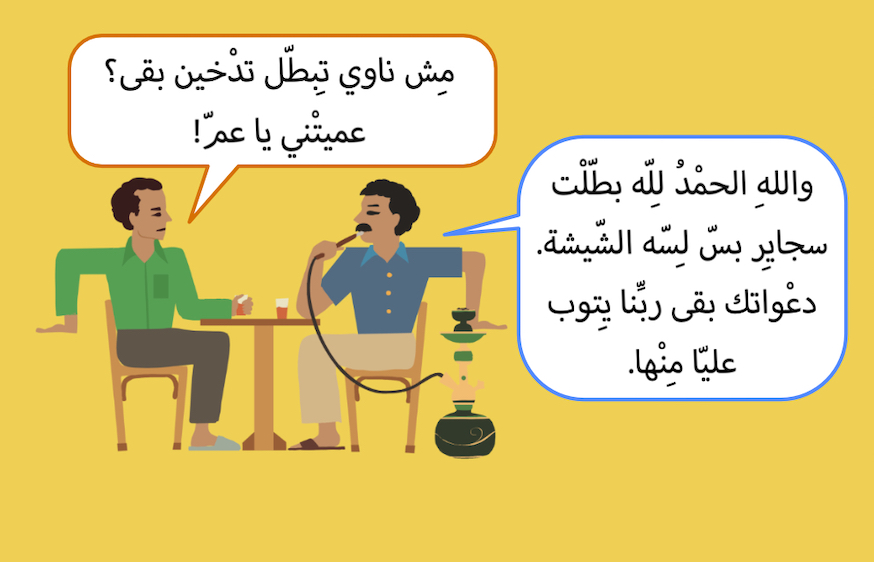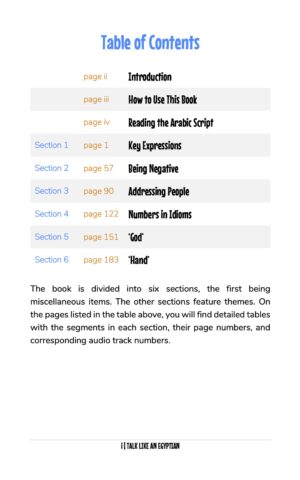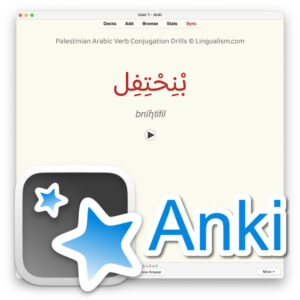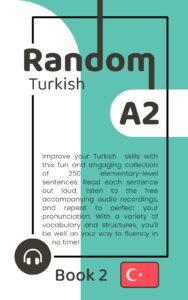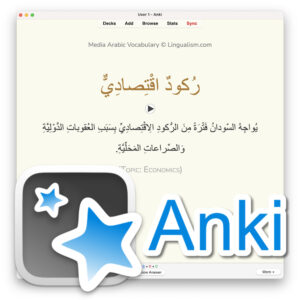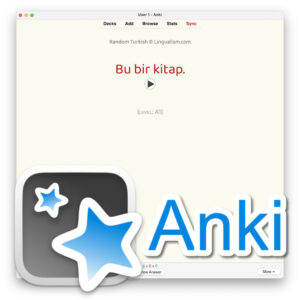Table of Contents
Introduction
If you’re old enough, you’ll remember learning to “walk like an Egyptian” back in the 1980s.* Little did you know back then that you’d be learning to talk like an Egyptian decades later!
But that’s easier said than done. One of the greatest challenges in learning any language is mastering idiomatic expressions so you can sound more natural and better understand native speakers. Most learning materials–dictionaries and even course books–may present idiomatic expressions and adverbs but usually with a simple translation and little guidance on when and how to use them.
And that’s why Talk Like an Egyptian is a unique and powerful language learning tool for intermediate learners. We go into depth with each word or phrase, providing detailed explanations, both literal and figurative translations, and dialogues that show you just how native speakers use it in context. We were careful to include only natural, high-frequency expressions in current use so that you can be confident in using them to sound more fluent and impress your Egyptian friends. يَلّا بينا! Let’s go!
* The American band ‘The Bangles’ had a number-one hit single called ‘Walk Like an Egyptian’ that popularized a dance with movements mimicking human poses depicted in Ancient Egyptian art.
How to Use The Book
There’s really no wrong way to use this book. You can study the segments in any order or work through the book systematically. You can use the tables of contents to find a topic, or you can randomly flip to any page and learn something new.
At the beginning of each segment, you can find an icon can in the top-right corner with the corresponding audio track number on which the dialogue(s) can be found.
The segment’s key word or expression appears as the title, followed by a title in English, which may be a translation that shows one meaning, or it may be a literal translation or other title to pique your interest and encourage you to read more.
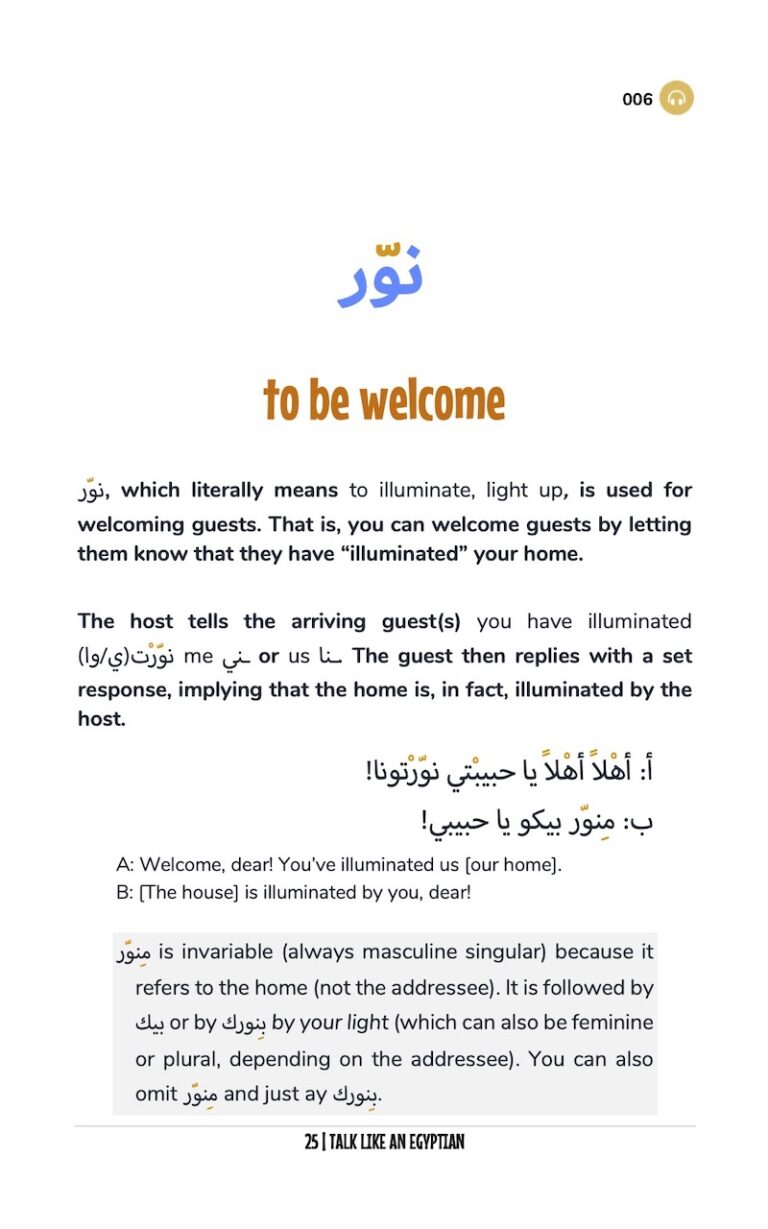
Next, we give you explanations, translations, tips on usage, background information, and cultural notes to help you really understand the word or expression and how it is used in natural language.
Short dialogues show you the word or expression in context.
Extra information and useful footnotes are given in gray boxes after many dialogues.
Although the book features over 100 key words and expressions, there are hundreds more throughout the dialogues–and this is where the real value and fun comes in. By being observant and comparing the Arabic to the translations, you can learn many, many more useful idiomatic expressions, structures, interjections, adverbs, and other vocabulary.
We hope you enjoy the book and learning to TALK LIKE AN EGYPTIAN!
Sections of the Book
Section 1: Key Expressions
In section 1, we’ll learn a variety of common everyday expressions, adverbs, and structures that will help you talk like an Egyptian.
| track 001 | page 2 | like this | كِده |
| track 002 | page 9 | to be interested in | لُهْ في |
| track 003 | page 13 | ‘thing’ | بِتاع |
| track 004 | page 20 | to “die” | مات |
| track 005 | page 24 | Believe it or not! | قال أيْه |
| track 006 | page 25 | to be welcome | نوّر |
| track 007 | page 27 | Very much! | أوي أوي |
| track 008 | page 29 | Go ahead! | اِتْفضّل |
| track 009 | page 37 | outside | برّه |
| track 010 | page 40 | already | خلاص |
| track 011 | page 46 | Heavenly! | نعيماً |
| track 012 | page 48 | reasonable | معْقول |
| track 013 | page 51 | hope and faith | عشم |
Section 2: Being Negative
In section 2, we learn more, essential, everyday expressions and adverbs–but these all have negative connotations.
| track 014 | page 58 | Enough! | بسّ |
| track 015 | page 60 | Never mind! | معلِشّ |
| track 016 | page 65 | No way! | اِبْقى قابِلْني |
| track 017 | page 67 | No can do! | مَيِنْفعْش |
| track 018 | page 69 | “without anything” | بلاش |
| track 019 | page 73 | nonsense | أيّ كلام |
| track 020 | page 76 | unacceptable | عيْب |
| track 021 | page 80 | forbidden | حرام |
| track 022 | page 85 | corrupt | شِمال |
| track 023 | page 88 | not in a million years | في المِشْمِش |
| track 024 | page 89 | Oh, my Joy! | يا فرْحِتي |
Section 3: Addressing People
We’ll start off section 3 with a formal way to address people. Then we’ll look at various ways to address strangers. Next, we’ll move on to people with whom you have a relationship. (When addressing someone who is not a stranger and who has certain respected occupations, you should use a specific form of address to acknowledge their professional status.) And finally, we’ll examine some familial terms and how they are used with actual family members but also with non-relatives in Egyptian culture.
When you know someone’s name and are on familiar terms, of course, you can simply address that person by their name. But when the person is a stranger, or the relationship is more formal, there are special forms of address in Egyptian Arabic. Using the wrong one can be amusing at best and offensive at worst, so it’s important to know when to use–and when not to use–certain terms. How you address someone depends not only on their gender, age, and social/professional status but also on yours and your relation to that person.
| track 025 | page 92 | formal ‘you’ | حضْرِتك |
| track 026 | page 96 | أُسْتاذ and أُسْتاذة | |
| track 027 | page 97 | حاجّ and حاجّة | |
| track 028 | page 99 | مدام and آنِسة | |
| track 029 | page 100 | حبيبي and حبيبْتي | |
| track 030 | page 103 | كابْتِن | |
| track 031 | page 104 | شيْخ | |
| track 032 | page 105 | ريِّس | |
| track 033 | page 106 | يافنْدِم | |
| track 034 | page 107 | باشا | |
| track 035 | page 109 | حضْرِةْ الظّابِط | |
| track 036 | page 110 | دُكْتوْر | |
| track 037 | page 112 | باشْمُهنْدِس | |
| track 038 | page 113 | مِتْر | |
| track 039 | page 114 | مِسْتر and ميس | |
| track 040 | page 115 | أُسْطى | |
| track 041 | page 116 | يابْني and يا بِنْتي | |
| track 042 | page 118 | عمّو and طنْط | |
| track 043 | page 120 | بابا and ماما | |
| track 044 | page 121 | جِدّو and تيْتة |
Section 4: Numbers in Idioms
There are numerous idioms in Egyptian Arabic that contain numbers. Some are straightforward and logical. Others seem as if there must be a story behind them, but Egyptians usually have little idea why this or that number is used in a particular idiom; they just use them without questioning them too much. In English, why do we say ‘on cloud nine,’ ‘in seventh heaven,’ ‘at sixes and sevens’? The point is, don’t worry too much about the history and logic behind such idioms. Just learn them and their meanings. A third kind of idiom with numbers is hyperbole, where any large number would do, but Egyptians have some favorites, as you’ll see in this section.
track 045 | page 124 | Slow down! | واحْدة واحْدة |
track 046 | page 125 | one, two, three… | الله واحِد … |
track 047 | page 126 | What’s the third of three? | تِلْت التّلاتة كام؟ |
track 048 | page 127 | a third tripled-up | تالِت و مْتلِّت |
track 049 | page 128 | the third is final | التّالْتة تابْتة |
track 050 | page 130 | five minutes | خمْسة |
track 051 | page 131 | Knock on wood! | خمْسة و خميسة |
track 052 | page 132 | to be beside oneself | ضرب أخْماس في أسْداس |
track 053 | page 133 | ‘donuts’ | خمْسات |
track 054 | page 134 | to search and search | لفّ سبع لفّات |
track 055 | page 135 | with seven lives | بِسبع ترْواح |
track 056 | page 136 | in a deep sleep | في سابِع نوْمة |
track 057 | page 137 | we’re all equal | كُلِّنا وِلاد تِسْعة |
track 058 | page 138 | ‘full moon’ | قمر أرْبعْتاشر |
track 059 | page 139 | It’s useless! | ملْهاش تلاتين لازْمة |
track 060 | page 140 | centipede | أُم أرْبعة و أرْبعين |
track 061 | page 141 | Go to hell! | في سِتّين داهْيَة |
track 062 | page 143 | Son of a … ! | إبْن سِتّين في سبْعين |
track 063 | page 144 | 110 jasmine flowers | ميةْ فُلّ و عشرة |
track 064 | page 145 | 300 welcomes! | يا تُلْتُميةْ مرْحبا |
track 065 | page 146 | a zillion times | عشْروميةْ مرّة |
track 066 | page 148 | A thousand congratulations! | ألْف مبْروك |
track 067 | page 149 | A thousand thanks! | ألْف شُكْر |
track 068 | page 150 | Welcome back! | ألْف حمْدِلْله عَ السّلامة |
Section 5: الله God
اللّه Allah is the Arabic name for God. It’s important to note that it’s used to refer to God not only by Muslims but also by Christians and Jews. The word originally comes from إلهْ god and, with the addition of the definite article الـ, has taken on the unique form اللّه: the [one and only] God
Unlike most other Arabs, however, Egyptians almost always refer to God as ربِّنا our Lord and rarely say اللّه except in set expressions and proverbs or when swearing. Note that, while some Christians in the West might take issue with “using the Lord’s name in vain”–even in expressions such as “Oh my God!”–it is not offensive to do so for Arabs. In fact, the word اللّه is, on its own, a common interjection in Egyptian Arabic and has acquired a variety of meanings to express different feelings as in the first expression presented in this section.
track 069 | page 153 | God! | الله! |
track 070 | page 157 | By God! | واللهِ |
track 071 | page 162 | God Willing! | إن شاء الله |
track 072 | page 167 | … and the Evil Eye | ما شاء الله |
track 073 | page 170 | Praise be to God! | الحمْدُ لِلّه |
track 074 | page 176 | Reliance on God | التّوَكُّل على الله |
track 075 | page 179 | May God make it easy! | ربِّنا يْسهِّل |
track 076 | page 181 | Damn you! | ربِّنا ياخْدك |
track 077 | page 182 | May God be generous with you! | ربِّنا يِكْرِمك |
Section 6: إيد hand
Body parts appear in so many idioms and proverbs in Egyptian Arabic. In this section, we’ll take a special look at the word إيد hand, which is particularly interesting. Its metaphorical senses are similar to those of ‘hand’ in English, expressing character traits, human behavior, and actions (after all, we do so many things with our hands), assistance, accessibility (being within reach), among others.
track 078 | page 186 | light-handed | إيدُه خفيفة |
track 079 | page 188 | heavy-handed | إيدُه تْقيلة |
track 080 | page 189 | deaf-handed | إيدُه طرْشا |
track 081 | page 190 | long-handed | إيدُه طَويلة |
track 082 | page 191 | dry-handed | إيدُه ناشْفة |
track 083 | page 192 | pierced-handed | إيدُه مخْرومة |
track 084 | page 193 | loose-handed | إيدُه سايْبة |
track 085 | page 195 | Be frugal! | اِمْسِك إيدك! |
track 086 | page 197 | as he witnessed… | على إيدُه |
track 087 | page 199 | Stop here! | على إيدك |
track 088 | page 200 | I support you | إيدي على كِتْفك |
track 089 | page 201 | to extend one’s hand | مدّ إيدُه |
track 090 | page 203 | out of reach | العيْن بصيرة و الإيد قصيرة |
track 091 | page 205 | to have a good grip on someone | مِسْكُه مِن إيدُه اللي بْتِوْجعُه |
track 092 | page 206 | to be right under one’s nose | تحْت إيدُه |
track 093 | page 207 | May your hands be safe! | تِسْلم إيدك |
track 094 | page 208 | to kiss one’s hand | باس إيدُه |
track 095 | page 209 | Gasp! | كُنْت حاطِط إيدي على قلْبي |
track 096 | page 211 | to ask for one’s hand in marriage | طلب إيدْها |
track 097 | page 212 | A single hand cannot clap. | إيد لِوَحْدها متْسقّفْش |
track 098 | page 213 | a hand upon a hand | إيد على إيد تِساعِد |
track 099 | page 214 | to lift one’s hand from | شال إيدُه مِن |
track 100 | page 216 | The answer’s right in front of you. | الحلّ في إيدُه |
track 101 | page 217 | generous | اللي في إيدُه مِش لُه |
track 102 | page 218 | a lost cause | إيدك مِنُّه و الأرْض |
track 103 | page 220 | I’m game! | أنا مِن إيدك دي لِإيدك دي |
track 104 | page 221 | Hey, watch it! | لِمّ إيدك و لْسانك |
track 105 | page 223 | essential | إيدي و رِجْلي |
track 106 | page 225 | to come back empty-handed | إيد وَرا و إيد قُدّام |
track 107 | page 227 | How was I supposed to know? | هشِمّ على ضهْر إيدي |
track 108 | page 229 | to wait and watch | وِقِف على إيدُه |
track 109 | page 231 | You don’t get it! | اللي إيدُه في المايّة… |
track 110 | page 233 | Idle hands are the devil’s tool. | الإيد البطّالة نِجْسة |

